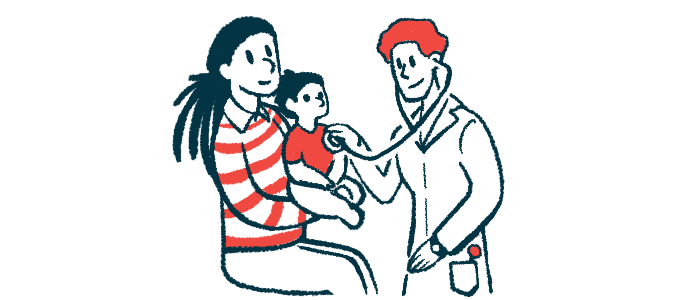Approved drug Soliris successfully treats aHUS in 14-month-old girl
Rare case may offer 'valuable insights' into treatment of pediatric patients
Written by |

Soliris (eculizumab), an approved drug for atypical hemolytic uremic syndrome (aHUS), successfully treated a rare case of the disease in a girl, age 14 months, in China, according to a case study.
After eight doses of the therapy, the levels of self-reactive antibodies against complement factor H — an important protein that limits the activity of the complement system, which normally is overactive in aHUS patients — significantly dropped and the infant recovered.
“The successful diagnosis and treatment of this 14-month-old Chinese girl with aHUS offer valuable insights and serve as a basis and reference for the formulation of individualized treatment strategies for pediatric [patients] with aHUS,” the researchers wrote
The case study, “Application of eculizumab, a terminal complement inhibitor, in the management of atypical hemolytic uremic syndrome in a 14-month-old Chinese pediatric patient: a case report,” was published in the journal Frontiers in Pediatrics.
Clinicians first tried plasma exchange for infant girl
aHUS is a rare type of thrombotic microangiopathy (TMA), a group of diseases characterized by the formation of blood clots in the body’s small vessels. These clots can obstruct these blood vessels and cause damage to internal organs, particularly the kidneys.
Clots are caused in aHUS by the overactivation of the complement cascade, a part of the immune system that normally helps defend the body from invading microbes.
Some patients have self-reactive antibodies that target complement-regulating proteins, such as complement factor H. These antibodies block the normal function of factor H, resulting in uncontrolled complement activation.
Some research has indicated that approximately half of all pediatric patients with aHUS have self-reactive antibodies against complement factor H.
Now, a team of scientists in Shanghai described the case of a young girl with aHUS who was successfully treated with the drug Soliris.
The previously healthy young girl was taken to the doctor after experiencing repeated vomiting and diarrhea for three days. After seeing no improvement following treatment with cefprozil, an antibiotic used to treat bacterial infections, doctors diagnosed her with acute gastroenteritis and admitted her to the hospital.
On her third day in the hospital, bloodwork revealed the baby was anemic and had thrombocytopenia, or a low number of platelets in the blood. High levels of creatinine in the blood indicated that the young patient’s kidneys were not working properly. Taken together, these observations were consistent with the diagnosis of TMA.
Bloodwork revealed elevated levels of self-reactive antibodies against complement factor H, as well as of C3 nephritic factors, a type of self-reactive antibody directed against an enzyme that’s part of the complement cascade. After ruling out other potential TMAs, doctors rendered a diagnosis of aHUS.
The girl immediately underwent plasma exchange, a type of treatment in which the liquid part of blood, known as plasma, is removed and replaced. After four rounds of plasma exchange, her platelet counts were still low, and she had microangiopathic hemolytic anemia — anemia driven by the destruction of red blood cells associated with the obstruction of small blood vessels — and acute kidney failure.
Soliris drug started after other therapy failed to work
After this failure to respond, the doctors administered 300 mg of Soliris into-the-vein, or intravenously, over a three-hour period. A second and third dose of Soliris were given at week one and week four. Soliris is an approved drug treatment for aHUS that works by blocking complement activation.
At this point, the patient improved, with her levels of hemoglobin, platelets, creatine, and complement proteins returning to normal ranges. Hemoglobin is the protein in red blood cells responsible for transporting oxygen.
Every three weeks thereafter, the infant was given another dose of Soliris, for a total of eight doses. After the eighth dose, self-reactive antibody levels decreased, indicating the patient had recovered.
Soliris’ dosing interval was then extended from every three weeks to once a month.
After approximately eight months of treatment with Soliris, the patient had recovered from aHUS without any relapses. Doctors plan to discontinue the treatment after nine or 10 months, and to continue monitoring the girl thereafter, the report states.
“At the time of submission, the patient had received 11 doses of [Soliris]. Since then, the patient has received an additional 3 doses, bringing the total to 14 doses by this month,” the researchers wrote. “The dosing interval has gradually been extended from once a month to once every 1.5 months, and now we are trying once every 2 months.”
There is a scarcity of data on pediatric aHUS associated with anti-complement factor H antibodies in the [Soliris] era, which makes it nearly impossible to effectively compare the benefit-to-risk ratios of different therapeutic strategies. … The patient’s condition is currently stable, with no adverse drug reactions reported.
The team concluded that the girl’s rare case of aHUS had been successfully treated.
“The patient’s condition is currently stable, with no adverse drug reactions reported,” they wrote.
According to the researchers, this case provides real-world evidence of a young patient with self-reactive antibodies against complement factor H.
“There is a scarcity of data on pediatric aHUS associated with anti-complement factor H antibodies in the [Soliris] era, which makes it nearly impossible to effectively compare the benefit-to-risk ratios of different therapeutic strategies,” the team wrote.







